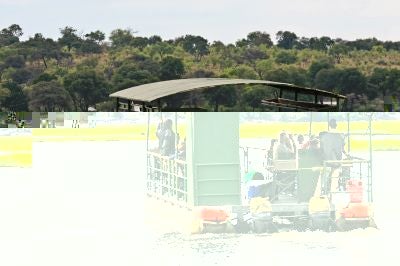Invading weed threatens livelihoods in Okavango tourist paradise

The unique Okavango Delta in northern Botswana is in danger from an invasive weed from Latin America which is threatening the livelihood of the local people dependent on fishing and income from tourism.
Salvinia molesta, also known as Kariba weed, is believed to have found its way to the world's only major inland delta via the rivers that feed into it from Angola.
The free floating dark green fern covering the water cuts off oxygen for fish and blocks the delta's channels for the traditional punt-like canoes known as mokoros.
Local communities and tourism interests are being encouraged to work together to defeat the menace, while scientists think they have found biological means to keep it under control.
"It is important for members of the community and tour operators to combine forces and fight this weed which is threatening the livelihood of most people in the Okavango region.
"Its effects may not be felt at the moment but if it spreads further then the fishermen will definitely feel the pinch," said Ketlhatlogile Masepelinge, a fisheries biologist at the University of Botswana.
"Fishing is a source of income for most of us in this part of Botswana, and if it means working day and night to destroy this weed which is threatening our fish, then let it be so," said Faosiko Wake, chairman of the Okavango Fishermen's Association.
The delta, teeming with wildlife, attracts thousands of tourists who stay in upmarket safari lodges, many of them accessible only by air, as well as zoologists and other researchers.
"Tourists love cruising in the delta and we have to make sure that nothing stands in their way," said Morongoe Ntloedibe, chief executive of the Hospitality and Tourism Association of Botswana.
Salvinia molesta has affected waterways across the world, including Australia, Southeast Asia and the Pacific as well as parts of Africa.
It has a phenomenal growth rate, doubling its dry weight in two and a half days when conditions are right according to Australia's national Commonwealth Scientific and Industrial Research Organisation (CSIRO).
"Salvinia grows quickly to form thick mats covering lakes, slow-moving rivers and other waterways," the CSIRO says on its website.
"These mats severely interfere with the use of water bodies for boating, irrigation, flood mitigation and conservation of wildlife. Once vital waterways become stagnant ponds supporting only Salvinia."
Fortunately, however, it has an enemy, tiny but deadly, in the shape of Cyrtobagous salviniae, a weevil which Australian scientists found feeding on the plant in its native Brazil.
According to the CSIRO, the two millimetre long weevils have succeeded in bringing Salvinia infestations under control in at least 13 tropical countries.
Now it is the turn of Botswana, where local inhabitants and tour operators alike are being trained how to breed the weevils, which have a lifespan of about 60 days, then release them into the delta.
"This is the best way of getting rid of this weed as the method is friendly to the environment. We could have used chemicals but these are harmful to other organisms in the water," the director of environmental affairs in the Ministry of Tourism, Wildlife and Environment, Steve Monna, told AFP.
He said the weed has been present in the delta for some time but in small quantities. However recent unusually high floods and strong winds have caused it to spread, prompting the government to launch the programme to destroy it.
"It is now up to the communities and tour operators to make sure that they work hard in breeding the weevils," he said.
Monna said so far the programme was progressing well as both parties had shown a commitment to working towards destroying Salvinia.
Subscribe to Independent Premium to bookmark this article
Want to bookmark your favourite articles and stories to read or reference later? Start your Independent Premium subscription today.

Join our commenting forum
Join thought-provoking conversations, follow other Independent readers and see their replies